Valiant voices against brute force: The fearless upstarts of Bangla rap
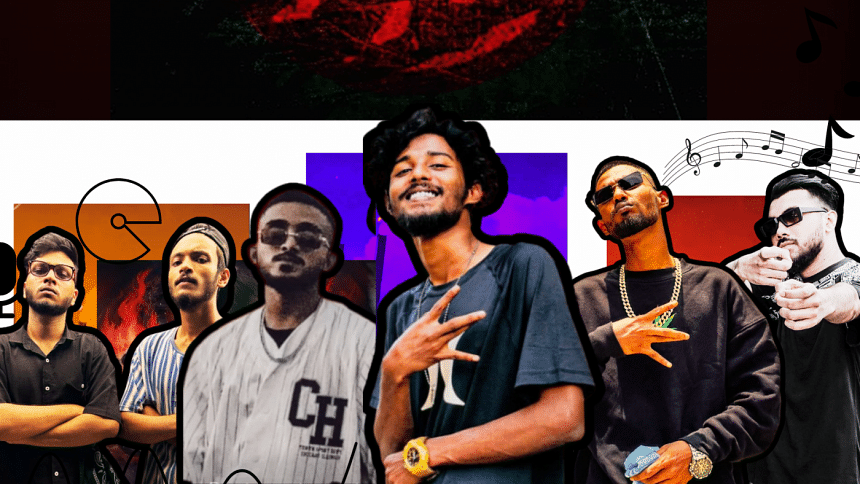
"But a bird that stalks
down his narrow cage
can seldom see through
his bars of rage
his wings are clipped and
his feet are tied
so he opens his throat to sing."
—Maya Angelou
What makes a public outcry different from a revolution, resistance, or uprising? What happens when thousands chant the same demands and enforce the obvious through music and chorus that differ only in mannerisms and language? When shouts become screams for freedom of expression and bodies that scream lie in countless mortuaries, revolution happens—spontaneously and naturally, like the wind blowing and seeds growing.
As of August 1, mass protests under the quota reform movement are ongoing throughout the country. The government is aggressively identifying those involved in violence related to the protests but neglecting the role of its own security forces in the deaths of over 165 people. Over 10,000 arrests have been made, many without due legal process, as noted in a recent editorial.

However stern, bold, brutal, and cunning forces may be, as Pablo Neruda puts it, "You cannot keep spring from coming." Bengal and Bangladesh have a history of being enshrouded by oppressive forces, always singing of freedom like a nightingale. In the past month, we have seen anger, frustration, violence, brutality, deaths, and denial, but we have also seen the spirit of youth, the strength of peace, courage, bravery, resistance, a 'war within a war,' and above all, the core of human evolution—its intrinsic scream for independence and freedom.
Along with the protestors on the streets, musicians, singers, and rappers from all walks of life—the voice of youth and the country now—are screaming with an untamable tool: poetry, lyricism, and music.
"If your time to you is worth savin'
Then you better start swimmin'
Or you'll sink like a stone
For the times they are a-changin'"
As Bob Dylan, often considered one of the greatest songwriters in history, puts it in his revolutionary anthem "The Times They Are a-Changin'." Dylan later recalled writing the song as a deliberate attempt to create an anthem of change for the moment, capturing the spirit of social and political upheaval that characterised the 1960s. Time echoes its course, speaking the truth no matter what or where—it always sings for the oppressed.

The ongoing mass uprising in the country is 'revolutionary' as popular political activist, historian, writer, and intellectual Badruddin Umar put it. We deemed it impossible again, something we have never seen before in its manner of becoming a collective outcry and in terms of 'unnecessary' pursued violence as well.
It's incredible how the same slogans, songs, anthems, and the spirit of Bengali nationalism and the Liberation War of 1971 are being echoed both on the streets and in assemblies, but this time with supporting views on the ongoing quota reform movement that has gripped the nation for the past month. Bengal has always been a land where political resurgence has stood on the stronghold of its culture.
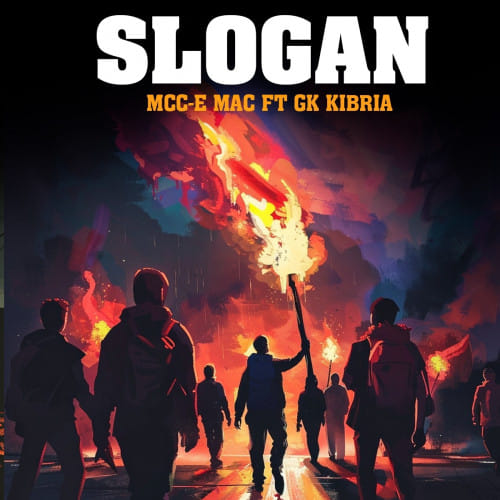
People of Bengal have always waged wars and formed rebellions through the purest form of art; the voice of the revolution has always been laid on this landscape with cultural dignity and opulence, through its songs, poems, graffiti, and mass folk songs. Oppressors have always confined us and bled us, but through it all, Bengalis have always risen above like a phoenix from the ashes.
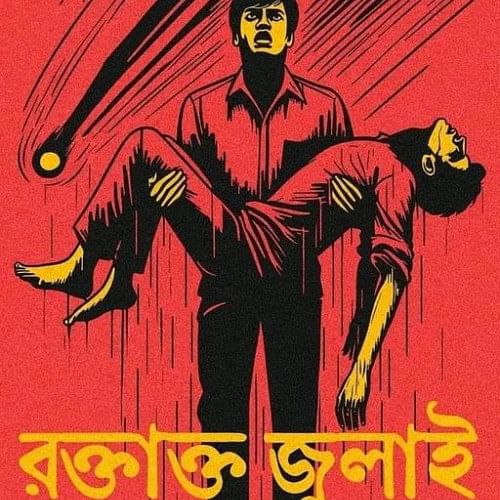
Rapper Hannan Hossain Shimul, who has recently come into the spotlight for his hit rebel rap "Awaaz Utha", was arrested on July 25 in Narayanganj's Bhuighor area.
Ironically, he starts his song by incorporating Bangabandhu Sheikh Mujibur Rahman's historic 7th March speech, with a chorus that tells us to call out freedom through Awaaz Utha Bangladesh. Hannan's lyrics loosely translate to:
"Bengalis are no fools, we won't fall for every trick they throw,
…Sayeed, I'm taking the bullet, smiling at the barrel's call,
Student voices rise, commands come from the hall."
Hannan's song, which sought freedom of speech, had gathered over 600,000 views on YouTube and was trending on #5 in music category till August 1. The song emphasised the strength of music in rebellion as it stands, as a cultural movement, mirroring the same values, empowering individuals to express their truths and confront societal challenges. However, his non-political stance couldn't save him from being imprisoned under unknown clauses of the law and jurisdiction.
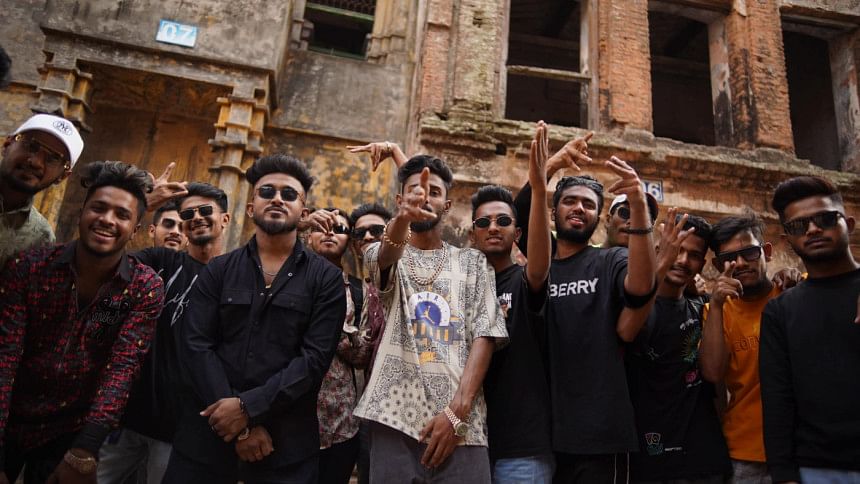
Dozens of rap songs came to prominence in the span of only a month to stand alongside the thousands of protestors across Bangladesh, voicing their demands and speaking of what the imprisoned, 'beaten up' and 'silenced' could not. Like Pablo Neruda's famous line "You can cut all the flowers but you cannot keep spring from coming," these fiery artistes are a voice that no oppressing entity could ever stop.
Another rapper Shezan, popularly known as Shezan Beatz, released his rap track "Kotha Ko" on July 16, which had gathered over 1.6 million views, making the YouTube trending list with the following lyrics.
"Where's the difference between 52 and 24? Speak up!
If the country claims freedom, where's the freedom? Speak up!
My siblings die on the streets, are you even trying? Speak up!"
Rap song, Gold Cube and Scary Crow's "Desh Shongskar", also borrows from a historic speech from Bangabandhu. In the song, they demand answers from the authorities for the mass imprisonment, usage of oppressive methods of handling peaceful students and protestors on the streets urging for a rightful demand, merit-based assessment and opportunities. His lyrics read, "Rebellion every time..not for jobs, stipends, but dignity...in a land ruled by tyrants, where thieves feast, more students die than birds from bullets," the song carries out with this message.

Another Rap song, "Desh Kar?" by Lunatix Veer and Rhythmsta, speaks no different than its predecessors, carrying the same spirit of resistance and uprising, which came back to us in every generation, the only difference perhaps is its usage of contemporary Bangla as a language.
"Quota na Medha?", dedicated to Abu Sayeed, who died after being shot by rubber bullets while protesting for the quota reform, chants the claim of the protesters, "Quota or Merit?".
"I dream of change,
…As death visits my life.
Chanting slogans, my voice cracks,
Counting bullet scars on my chest."
Most of these songs speak of the same demands, cries, chants we hear through shouts, chants, slogans, in poetry and spirit. They are of the same message with different words put together eloquently, beautifully and blatantly, looking eye to eye with a higher power.

Joining in the rebellious voices are "Chobbisher Guerrilla" by the rap group by the same name (trending #18 on YouTube for music), Omix's "Rokto", Mcc-e Mac and Gk Kibria's "Inquilab", Lazy Panda O'seven and Dashu's "Freedom ain't free", Crown Engine's "Daam De", Flag Bang's "Godi Chhar", Chef-IQ's "Bangla Ma", Raafky's "Odhikaar", Coldcraft and Bihan's "Bayanno", Mascot's "Freedom?", Wakeup Hadi's "Shokuner Chokh", and Rafsan Ahmed Siam's "Joy Bangla", while many others have become the voice of the bleeding country whose sons and daughters are on the streets fighting for their cause.

Not only rap songs, but prominent mainstream singers have also come forward with their voice, lyrical ingenuity, and musical brilliance. One such song is Parsha Mahjabeen Purnee's "Cholo Bhule Jai". The musicians call out those who opted for silence even amidst this public outcry and resistance that bureaucrats could not pacify with armoured tanks and every law enforcement agency the country has. A few lines of Parsha's song read,
"Let's forget,...how lives were lost, how nights were spent in regret.
I'll forget the bullet's scar on enchanted skin,
Let's forget Abu Sayeed's courageous chest and bold grin.
Remember the music and soundtracks, let this amnesia last.
Let's forget the murders our eyes.".
These young upstarts of Bangla rap have achieved a feat that the mainstream music industry in Bangladesh could never achieve in this decade -- point their valiant, unsheathed, and belligerent voice against the guns of the oppressors.
Amidst the burgeoning uprising and resistance, as our poets, lyricists, writers, singers, musicians, and artists keep rising like a red phoenix with all they have, we will end this article where we started, with American memoirist, poet, and civil rights activist Maya Angelou's "Caged Bird":
"The caged bird sings
with a fearful trill
of things unknown
but longed for still
and his tune is heard
on the distant hill
for the caged bird
sings of freedom."

 For all latest news, follow The Daily Star's Google News channel.
For all latest news, follow The Daily Star's Google News channel. 



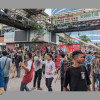

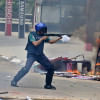


Comments